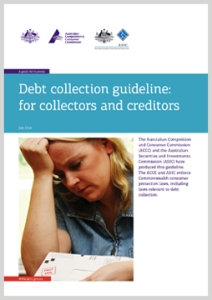 The ACCC and ASIC have launched a new publication, Dealing with debt collectors: Your rights and responsibilities, a guide which explains:
The ACCC and ASIC have launched a new publication, Dealing with debt collectors: Your rights and responsibilities, a guide which explains:
- people’s legal rights and responsibilities if they owe a debt;
- where to seek help to work out a budget, negotiate a repayment plan, apply for hardship or better understand their financial and legal options;
- what to do if a debt collector contacts them;
- what sort of behaviour by debt collectors is not acceptable;
- how to dispute an alleged debt or its amount; and
- what to do if they are being taken to court.
The guide has been released at a time when the ACCC and ASIC are actively investigating, and successfully prosecuting, corporations (including large debt collection companies) for their unscrupulous debt collection practices.
In 2012, following an application by ASIC to commence proceedings, the Federal Court found a debt collection company, ACM Group Limited, had harrassed and coerced debtors and engaged in “widespread” and “systemic” misleading and deceptive conduct when recovering money.
In 2013, the ACCC prosecuted Excite Mobile Pty Ltd for engaging in false, misleading and unconscionable telemarketing practices, and using undue coercion in relation to debt collection. For example, the company created a fake complaints handling organisation to deceive debtors into believing their disputes about liability were being assessed by an independent body when neither that body nor those activities existed. The Federal Court ordered the company to pay a penalty of $455,000 and the company’s two directors were ordered to pay penalties totalling $95,000 between them.
What guidance is there for creditors and collectors?
 Earlier this year, the ACCC and ASIC released a new version of the industry guide, Debt collection guide for creditors and collectors, which was updated to reflect the introduction of the Australian Consumer Law and changes to privacy laws in Australia.
Earlier this year, the ACCC and ASIC released a new version of the industry guide, Debt collection guide for creditors and collectors, which was updated to reflect the introduction of the Australian Consumer Law and changes to privacy laws in Australia.
The guidance includes information about:
- when it is appropriate to contact a debtor (e.g. what constitutes reasonable contact hours, methods or frequency of contact);
- the potential pitfalls in using modern technology in the debt recovery process;
- what to do if a debtor indicates that they cannot afford to repay the debt (e.g. making reasonable enquiries as to their financial position);
- key considerations when resolving debtor complaints and disputes.
Contact Melissa Lammers if you have any questions about debt, whether as the debtor (that is, the person who owes money to another person) or the creditor (that is, the person who is owed money by another person).
